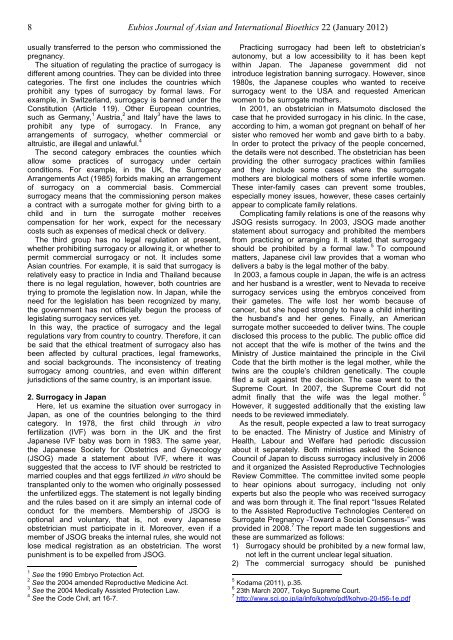Eubios Journal of Asian and International Bioethics - Eubios Ethics ...
Eubios Journal of Asian and International Bioethics - Eubios Ethics ...
Eubios Journal of Asian and International Bioethics - Eubios Ethics ...
You also want an ePaper? Increase the reach of your titles
YUMPU automatically turns print PDFs into web optimized ePapers that Google loves.
8 <strong>Eubios</strong> <strong>Journal</strong> <strong>of</strong> <strong>Asian</strong> <strong>and</strong> <strong>International</strong> <strong>Bioethics</strong> 22 (January 2012)<br />
usually transferred to the person who commissioned the<br />
pregnancy.<br />
The situation <strong>of</strong> regulating the practice <strong>of</strong> surrogacy is<br />
different among countries. They can be divided into three<br />
categories. The first one includes the countries which<br />
prohibit any types <strong>of</strong> surrogacy by formal laws. For<br />
example, in Switzerl<strong>and</strong>, surrogacy is banned under the<br />
Constitution (Article 119). Other European countries,<br />
such as Germany, 1 Austria, 2 <strong>and</strong> Italy 3 have the laws to<br />
prohibit any type <strong>of</strong> surrogacy. In France, any<br />
arrangements <strong>of</strong> surrogacy, whether commercial or<br />
altruistic, are illegal <strong>and</strong> unlawful. 4<br />
The second category embraces the counties which<br />
allow some practices <strong>of</strong> surrogacy under certain<br />
conditions. For example, in the UK, the Surrogacy<br />
Arrangements Act (1985) forbids making an arrangement<br />
<strong>of</strong> surrogacy on a commercial basis. Commercial<br />
surrogacy means that the commissioning person makes<br />
a contract with a surrogate mother for giving birth to a<br />
child <strong>and</strong> in turn the surrogate mother receives<br />
compensation for her work, expect for the necessary<br />
costs such as expenses <strong>of</strong> medical check or delivery.<br />
The third group has no legal regulation at present,<br />
whether prohibiting surrogacy or allowing it, or whether to<br />
permit commercial surrogacy or not. It includes some<br />
<strong>Asian</strong> countries. For example, it is said that surrogacy is<br />
relatively easy to practice in India <strong>and</strong> Thail<strong>and</strong> because<br />
there is no legal regulation, however, both countries are<br />
trying to promote the legislation now. In Japan, while the<br />
need for the legislation has been recognized by many,<br />
the government has not <strong>of</strong>ficially begun the process <strong>of</strong><br />
legislating surrogacy services yet.<br />
In this way, the practice <strong>of</strong> surrogacy <strong>and</strong> the legal<br />
regulations vary from country to country. Therefore, it can<br />
be said that the ethical treatment <strong>of</strong> surrogacy also has<br />
been affected by cultural practices, legal frameworks,<br />
<strong>and</strong> social backgrounds. The inconsistency <strong>of</strong> treating<br />
surrogacy among countries, <strong>and</strong> even within different<br />
jurisdictions <strong>of</strong> the same country, is an important issue.<br />
2. Surrogacy in Japan<br />
Here, let us examine the situation over surrogacy in<br />
Japan, as one <strong>of</strong> the countries belonging to the third<br />
category. In 1978, the first child through in vitro<br />
fertilization (IVF) was born in the UK <strong>and</strong> the first<br />
Japanese IVF baby was born in 1983. The same year,<br />
the Japanese Society for Obstetrics <strong>and</strong> Gynecology<br />
(JSOG) made a statement about IVF, where it was<br />
suggested that the access to IVF should be restricted to<br />
married couples <strong>and</strong> that eggs fertilized in vitro should be<br />
transplanted only to the women who originally possessed<br />
the unfertilized eggs. The statement is not legally binding<br />
<strong>and</strong> the rules based on it are simply an internal code <strong>of</strong><br />
conduct for the members. Membership <strong>of</strong> JSOG is<br />
optional <strong>and</strong> voluntary, that is, not every Japanese<br />
obstetrician must participate in it. Moreover, even if a<br />
member <strong>of</strong> JSOG breaks the internal rules, she would not<br />
lose medical registration as an obstetrician. The worst<br />
punishment is to be expelled from JSOG.<br />
1 See the 1990 Embryo Protection Act.<br />
2 See the 2004 amended Reproductive Medicine Act.<br />
3 See the 2004 Medically Assisted Protection Law.<br />
4 See the Code Civil, art 16-7.<br />
Practicing surrogacy had been left to obstetrician’s<br />
autonomy, but a low accessibility to it has been kept<br />
within Japan. The Japanese government did not<br />
introduce legistration banning surrogacy. However, since<br />
1980s, the Japanese couples who wanted to receive<br />
surrogacy went to the USA <strong>and</strong> requested American<br />
women to be surrogate mothers.<br />
In 2001, an obstetrician in Matsumoto disclosed the<br />
case that he provided surrogacy in his clinic. In the case,<br />
according to him, a woman got pregnant on behalf <strong>of</strong> her<br />
sister who removed her womb <strong>and</strong> gave birth to a baby.<br />
In order to protect the privacy <strong>of</strong> the people concerned,<br />
the details were not described. The obstetrician has been<br />
providing the other surrogacy practices within families<br />
<strong>and</strong> they include some cases where the surrogate<br />
mothers are biological mothers <strong>of</strong> some infertile women.<br />
These inter-family cases can prevent some troubles,<br />
especially money issues, however, these cases certainly<br />
appear to complicate family relations.<br />
Complicating family relations is one <strong>of</strong> the reasons why<br />
JSOG resists surrogacy. In 2003, JSOG made another<br />
statement about surrogacy <strong>and</strong> prohibited the members<br />
from practicing or arranging it. It stated that surrogacy<br />
should be prohibited by a formal law. 5 To compound<br />
matters, Japanese civil law provides that a woman who<br />
delivers a baby is the legal mother <strong>of</strong> the baby.<br />
In 2003, a famous couple in Japan, the wife is an actress<br />
<strong>and</strong> her husb<strong>and</strong> is a wrestler, went to Nevada to receive<br />
surrogacy services using the embryos conceived from<br />
their gametes. The wife lost her womb because <strong>of</strong><br />
cancer, but she hoped strongly to have a child inheriting<br />
the husb<strong>and</strong>’s <strong>and</strong> her genes. Finally, an American<br />
surrogate mother succeeded to deliver twins. The couple<br />
disclosed this process to the public. The public <strong>of</strong>fice did<br />
not accept that the wife is mother <strong>of</strong> the twins <strong>and</strong> the<br />
Ministry <strong>of</strong> Justice maintained the principle in the Civil<br />
Code that the birth mother is the legal mother, while the<br />
twins are the couple’s children genetically. The couple<br />
filed a suit against the decision. The case went to the<br />
Supreme Court. In 2007, the Supreme Court did not<br />
admit finally that the wife was the legal mother. 6<br />
However, it suggested additionally that the existing law<br />
needs to be reviewed immediately.<br />
As the result, people expected a law to treat surrogacy<br />
to be enacted. The Ministry <strong>of</strong> Justice <strong>and</strong> Ministry <strong>of</strong><br />
Health, Labour <strong>and</strong> Welfare had periodic discussion<br />
about it separately. Both ministries asked the Science<br />
Council <strong>of</strong> Japan to discuss surrogacy inclusively in 2006<br />
<strong>and</strong> it organized the Assisted Reproductive Technologies<br />
Review Committee. The committee invited some people<br />
to hear opinions about surrogacy, including not only<br />
experts but also the people who was received surrogacy<br />
<strong>and</strong> was born through it. The final report “Issues Related<br />
to the Assisted Reproductive Technologies Centered on<br />
Surrogate Pregnancy -Toward a Social Consensus-” was<br />
provided in 2008. 7 The report made ten suggestions <strong>and</strong><br />
these are summarized as follows:<br />
1) Surrogacy should be prohibited by a new formal law,<br />
not left in the current unclear legal situation.<br />
2) The commercial surrogacy should be punished<br />
5 Kodama (2011), p.35.<br />
6 23th March 2007, Tokyo Supreme Court.<br />
7 http://www.scj.go.jp/ja/info/kohyo/pdf/kohyo-20-t56-1e.pdf

















